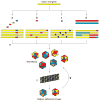Molecular engineering of viral gene delivery vehicles
- PMID: 18647114
- PMCID: PMC2683887
- DOI: 10.1146/annurev.bioeng.10.061807.160514
Molecular engineering of viral gene delivery vehicles
Abstract
Viruses can be engineered to efficiently deliver exogenous genes, but their natural gene delivery properties often fail to meet human therapeutic needs. Therefore, engineering viral vectors with new properties, including enhanced targeting abilities and resistance to immune responses, is a growing area of research. This review discusses protein engineering approaches to generate viral vectors with novel gene delivery capabilities. Rational design of viral vectors has yielded successful advances in vitro, and to an extent in vivo. However, there is often insufficient knowledge of viral structure-function relationships to reengineer existing functions or create new capabilities, such as virus-cell interactions, whose molecular basis is distributed throughout the primary sequence of the viral proteins. Therefore, high-throughput library and directed evolution methods offer alternative approaches to engineer viral vectors with desired properties. Parallel and integrated efforts in rational and library-based design promise to aid the translation of engineered viral vectors toward the clinic.
Figures



References
-
- Edelstein ML, Abedi MR, Wixon J. Gene therapy clinical trials worldwide to 2007—an update. J Gene Med. 2007;9:833–42. - PubMed
-
- Verma IM, Weitzman MD. Gene therapy: twenty-first century medicine. Annu Rev Biochem. 2005;74:711–38. - PubMed
-
- Cavazzana-Calvo M, Hacein-Bey S, de Saint Basile G, Gross F, Yvon E, et al. Gene therapy of human severe combined immunodeficiency (SCID)-X1 disease. Science. 2000;288:669–72. - PubMed
-
- Manno CS, Pierce GF, Arruda VR, Glader B, Ragni M, et al. Successful transduction of liver in hemophilia by AAV-Factor IX and limitations imposed by the host immune response. Nat Med. 2006;12:342–47. - PubMed
-
- Hacein-Bey-Abina S, Von Kalle C, Schmidt M, McCormack MP, Wulffraat N, et al. LMO2-associated clonal T cell proliferation in two patients after gene therapy for SCID-X1. Science. 2003;302:415–19. - PubMed
Publication types
MeSH terms
Grants and funding
LinkOut - more resources
Full Text Sources
Other Literature Sources
Medical

